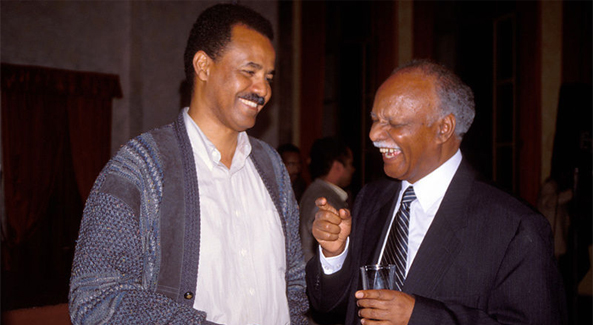Date: Thu, 27 Nov 2014 07:20:21 -0700
[image: "This presentation was delivered by Yemane Ghebremeskel, Director,
Office of the President of Eritrea, and is intended to elaborate and
highlight Eritrea’s views and perspectives on the putative controversies or
conjectures that surround the central theme of the workshop, “From
Liberation Movements to Government – Past legacies and the challenges of
transition in Africa” jointly organized by Konrad-Adenauer-Stiftung, in
cooperation with the South African think-tank, the Brenthurst Foundation in
2012. In light of the many narratives presented about Eritrea, its people
and government by Ethiopia and its surrogates in the Eritrean Quislings
League (EQL), some western anthropologists, NGO networks and the media, on
the issue of governance and liberation movements, it is this author’s
opinion that we ought to defer to those with first hand knowledge and
experience." - Sophia Tesfamariam]
(TN)This presentation was delivered by Yemane Ghebremeskel, Director,
Office of the President of Eritrea, and is intended to elaborate and
highlight Eritrea’s views and perspectives on the putative controversies or
conjectures that surround the central theme of the workshop, “From
Liberation Movements to Government – Past legacies and the challenges of
transition in Africa” jointly organized by Konrad-Adenauer-Stiftung, in
cooperation with the South African think-tank, the Brenthurst Foundation in
2012. In light of the many narratives presented about Eritrea, its people
and government by Ethiopia and its surrogates in the Eritrean Quislings
League (EQL), some western anthropologists, NGO networks and the media, on
the issue of governance and liberation movements, it is this author’s
opinion that we ought to defer to those with first hand knowledge and
experience.
Read more at
http://www.tesfanews.net/from-liberation-to-governance-the-eritrean-experience/#rbAwkEuUu81P0SHx.99
*https://cyberadal.wordpress.com/2014/11/27/ts-news-from-liberation-to-governance-the-eritrean-experience/
<https://cyberadal.wordpress.com/2014/11/27/ts-news-from-liberation-to-governance-the-eritrean-experience/>*
*1) Process** of Legitimization and Institution Building:*
The EPLF did not proclaim national independence when it liberated the
country on 24 May 1991. For reasons of international legitimization and
internal consensus, it announced that political independence would be
determined and declared after conducting an internationally supervised
referendum that would be held within the interim period of two years. To
put on hold the formal declaration of independence after so much sacrifice
and tortuous struggle of three decades underscores, in my view, three
pivotal dispositions:
i) the EPLF’s stance on the primacy of law and legality; ii) its emphasis
on participatory politics and consensus building; and iii) its inclination
to subordinate the urgency of time to the reliability of process and
ultimate outcome.
The referendum was resoundingly successful in showcasing the institutional
capability and efficiency of the Front, although that was not the
intention, and to secure instantaneous international recognition of
independent Eritrea. All these were operational strategies and approaches
cemented during the period of struggle. Building the institutions of the
State was also approached in the same deliberate way. The Independence of
the Judiciary was upheld from the outset and the Transitional Penal, Civil.
Commercial Codes and Procedural Guidelines, most of which were revised by
the legal department of the EPLF in the field, were published in the
Gazette in 1991. The transitional legislative body was formed with 150
members, 75 of which came from the legislative body of the EPLF while the
other 75 members were directly elected from the six Administrative Zones.
The civil service was adopted as is with the juxtaposition of senior
combatants at higher echelons of the institution. Phased demobilization
programmes that reduced the liberation, now national, army from 100,000 to
35,000, moral recognition and financial compensation for families of the
60,000 combatants and other major milestones were similarly implemented
relatively smoothly.
*2) The Constitutional Process:*
The transitional assembly formed in the manner described above had full
legislative powers to pass and enact new laws as well as to approve the
annual budget. The necessity of a written constitution was nonetheless
recognized from the outset and in 1995, the Government formed a 52-member
Constitution Drafting body from legal experts, elders, all ethnic/language
groups with proportional representation of women. And in the best
traditions of the Front, the draft Constitution, which enshrined
fundamental human rights and liberties, was widely discussed, through open
seminars, at all levels of the society through the width and breadth of the
country as well as in the Diaspora. These debates were also preceded by
extensive seminars on civic education. The Constitution was finally
approved in 1998 through a representative Constituent Assembly. It has not
been fully implemented for reasons that I will describe later. But again
in this vital process, the best traditions of stakeholder consultation,
intensive grassroots communication, and protracted approaches nurtured
during the liberation struggle were invoked for optimal outcomes.
Ibrahim Suliman

(image/jpeg attachment: pia-smile.jpg)